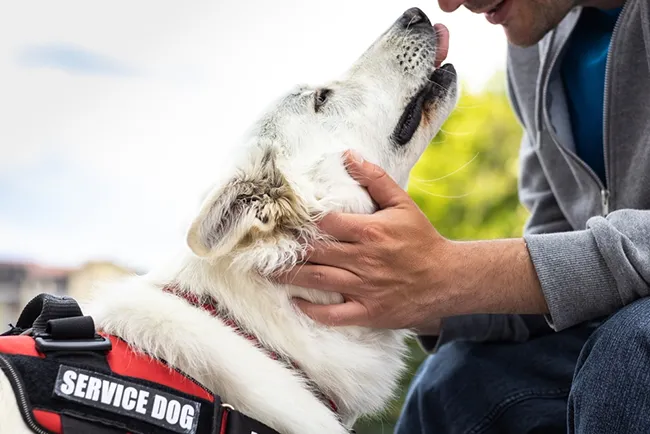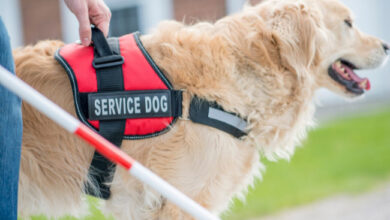
In the intricate tapestry of modern society, dogs have evolved far beyond their traditional roles as companions and protectors. Today, they are integral to various aspects of public safety and legal matters, exhibiting an astonishing range of abilities that bolster human efforts in these vital sectors. This article delves into dogs’ multifaceted roles in public safety and legal scenarios, highlighting their contributions and evolving perceptions of their capabilities in legal contexts.
The bond between humans and dogs is one of the animal kingdom’s most enduring and mutually beneficial relationships. Historically revered for their loyalty and instinctive protective nature, dogs have long been more than just pets. Their roles have expanded significantly in contemporary society, particularly in public safety and legal arenas. These animals are not just our companions but are pivotal players in maintaining order, ensuring safety, and even aiding in legal proceedings.
In recent years, the concept of ‘nationwide dog breeds vs. owner trust‘ has gained traction, as diverse dog breeds are employed in various public and legal capacities, breaking stereotypes and fostering a deeper understanding of the canine world. This evolution in perception is not only a testament to the versatility of these animals but also reflects a broader societal shift towards recognizing and utilizing the unique talents of different dog breeds.
Dogs in Public Safety: Heroes in Fur Coats
Law Enforcement and Detection
In law enforcement, dogs are more than just partners; they are essential for crime prevention and detection. Police K-9 units across the globe rely on the keen senses of dogs, particularly their sense of smell, which is thousands of times more acute than that of humans. These dogs are trained to sniff out narcotics, explosives, and even electronic devices. Their ability to follow a scent trail makes them invaluable in search and rescue operations, often finding lost or trapped individuals in situations where human searchers would fail.
Fire and Rescue Missions
In fire and rescue missions, dogs play a critical role. Their agility and sense of smell allow them to navigate challenging terrains and detect humans trapped under rubble in disaster zones. Their contributions in such scenarios have not only saved lives but also provided emotional support to victims and rescue teams alike.
Dogs in Legal Matters: Beyond the Bark
Courtroom Assistance
The legal system’s recognition of dogs extends to their remarkable role in courtroom assistance, a facet that has gained significant attention in recent years. Specially trained dogs are brought into courtrooms to provide emotional support to vulnerable witnesses, which has proven especially beneficial for children. With their calming presence, these dogs help mitigate the stress and trauma often associated with testifying in a legal setting. Their presence can be particularly impactful in cases involving sensitive matters, where the emotional toll on witnesses can be substantial.
The effectiveness of dogs in this role is rooted in their ability to offer non-judgmental comfort and support. Their presence can reduce anxiety and lower heart rate and blood pressure, creating a more conducive environment for witnesses to share their experiences.
Furthermore, these canine companions have shown a remarkable ability to help witnesses recall events more clearly, a key factor in pursuing justice. This innovative use of dogs is not just a testament to their versatility but also reflects a progressive shift in legal practices, recognizing the importance of mental well-being in the judicial process.
Dogs in Forensic Investigations
In forensic investigation, dogs have established themselves as invaluable assets. Cadaver dogs, specifically trained to detect human remains, have become integral to numerous law enforcement agencies worldwide. Their involvement in forensic investigations goes beyond mere detection; they have been instrumental in uncovering evidence in cold cases and recent crimes. These dogs can differentiate between various scents related to decomposition, making them crucial in locating bodies in diverse and challenging environments.
Their skill set is not limited to finding remains; some are trained to detect minute traces of blood or other bodily fluids, which can be pivotal in crime scene investigations. The accuracy and efficiency of these dogs in locating evidence often lead to breakthroughs in otherwise stalled investigations.
In numerous instances, cadaver dogs have found critical evidence that human investigators have overlooked, providing key leads that help piece together the events of a crime. This has not only aided in solving crimes but also brought closure to families of missing persons. The role of dogs in forensic investigations exemplifies their extraordinary abilities and underscores their importance in the intricate dance of legal and investigative processes.
Conclusion
The role of dogs in public safety and legal matters is profound and continually evolving. These animals are no longer just the guardians at our homes but are guardians of society at large. Their contributions to law enforcement, rescue operations, and legal proceedings underscore their irreplaceable value. As our understanding of canine abilities grows, so does our ability to harness their skills for the greater good. Whether it’s through sniffing out danger or offering comfort in a courtroom, dogs have proven that they are man’s best friend – not just in our homes, but in the very fabric of our society.



